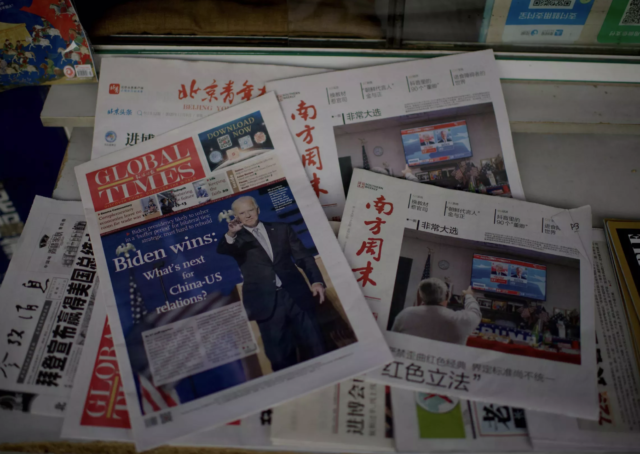America’s electoral drama comes at a crossroads for several of the world’s most pressing security threats. While the U.S. waits for a new administration to take office, China, Iran and Turkey find themselves under pressure to act.
China has been hoping to oust the U.S. from the Western Pacific for decades and might believe that between the coronavirus, summer riots, the contested election and the almost total absence of international news in American papers, now is its chance to do something important for Beijing’s interests. A direct attack on U.S. ally Taiwan is probably not in the cards, although the island nation understandably has the shakes. China has long coveted islands governed by Taipei. John F. Kennedy and Richard Nixon debated China’s designs on the Taiwan-governed islands of Quemoy and Matsu in the 1960 presidential election. Those islands are still there and China still wants them.
If China were to make a move, would the U.S. supply Taiwan’s defense needs under the Taiwan Relations Act? Or would it say, “Who cares about a couple of islands” and move on? What would our friends in Japan, South Korea, the Philippines, Australia, New Zealand and even India think if Washington blinked at further Chinese aggression in the region?
Meanwhile, China is in trouble at home. We have been aware of the size of its deficit for some time, but current food shortages create much more popular pressure than economic policy. Swine Fever may have killed more than 40 percent of China’s pigs—that’s about 180 million pigs—in 2019. Floods in the Yangtze River basin, which produces 70 percent of China’s rice output, have damaged millions of arable acres. Imports of grain are way up—further stressing China’s already stressed economy, and Beijing has banned food imports from Australia in a fit of pique that will hurt China more than Australia.
Famine is not unknown in China. Millions starved in Mao’s famine in the 1950s and ’60s. Beijing’s “Clean Plate Campaign” begun earlier this year is a hard hit for Chinese people accustomed to relative food security. Beijing’s response to waste is likely to be as harsh internally as was its despotic response to the virus, but one way to refocus the attention of people for whom dinner is not assured would be to win a “national victory.”
Perhaps one in Quemoy and Matsu.
The same general challenge that faces China faces the Mullahs of Iran—what can you do when your domestic economy is failing, and the pandemic is out of control? Iran could stop building nuclear weapons capability and ballistic missiles. It could stop planting precision missile factories in Syria and Lebanon. It could stop funding the Houthis’ war in Yemen. Instead, Tehran is stealing oil from Iraq and trying to sell it as its own—even as the Iraqis are beginning loudly to object. Iran opted to ship oil to Venezuela until the U.S. began seizing the ships and confiscating the cargo. It wasn’t enough. There have been various uprisings, strikes and protests across Iran since late 2017, and now the war to the north between Armenia and Azerbaijan is making the 40 percent of Iranians who are of Azeri origin nervous.
Is external conflict an option? Iran is considering purchasing Chinese arms—a move that often results in China acquiring hard assets in a country put up as collateral for the loans to buy the weapons; imagine China with a base in the Persian Gulf.
Oh, and about Azerbaijan. There are credible reports that Turkey has moved Syrian jihadist mercenaries to fight against Armenian forces in the Nagorno-Karabakh region, drawing the ire of Russia and expanding the potential for regional war. You haven’t read much about the war between Armenia and Azerbaijan since the U.S. is unlikely to send troops anywhere near there—which is a good thing—but the regional implications should nonetheless be a priority.
Turkey remains a NATO partner regardless of its actual behavior, and there is no mechanism for booting a country from the alliance. Following the announcement of Turkey’s purchase of Russia’s S-400 missile system, Congress quietly shut down most arms sales to Ankara, but Turkey shows no signs of changing its plans for future purchases, since Russia offers credit—at least for now.
The Turkish economy has contracted hugely since the beginning of the pandemic, and the country’s banks have engaged in some very strange monetary policy to keep from showing the size of the deficit. Its new social media law stifles dissent, though the government was already harassing and imprisoning dissidents and pressuring judges to keep the Turkish people in line.
Under the rule of Recep Tayyip Erdogan, Turkey has gone from a country with a “no problems with the neighbors” foreign policy to one fighting on multiple fronts: in Syria and Libya as well as Azerbaijan. In addition, Turkey and Libya reached a maritime agreement to split the eastern part of the Mediterranean Sea between them. Turkey lays claim to oil and gas fields around Greece and Cyprus and, if the maritime boundary was enforced, it could prevent Egypt, Israel, the Palestinian Authority and Lebanon from exporting across the line without Turkish and Libyan permission. Energy exploration and exports could be vastly curtailed.
And then there’s Israel, normally a country at the center of American foreign policy. In late 2020, however, it may be the one country that can afford to wait, and that might actually profit from a little benign neglect by the U.S. Having made a series of new arrangements with its neighbors, a settling-in period without pressure for even more agreements could help Israel, even as the Israeli government makes necessary choices about confronting its enemies to the north.
Each country’s decision—to wait or to act aggressively under pressure—could determine the future for us all.






